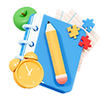Curriculum for Secondary Level
(Level 4 & 5)

At the Secondary level, our curriculum develops critical reading, analytical thinking, and persuasive communication, encouraging students to question and think deeply rather than just consume information.
They engage with complex texts, advanced comprehension, and literary analysis to sharpen critical thinking.
We emphasize public speaking, argumentation, and critical listening, where students evaluate sources and synthesize information.
The writing component focuses on crafting analytical essays, persuasive texts, and creative narratives, preparing students for both secondary and tertiary education.
Click here to view the 2025 Class Schedule.
Level Guide
BrightThinkers Academy structures lessons from Level 1 to 5 by combining two age groups per level, allowing students to learn at a faster pace.
This approach challenges them appropriately, fostering growth and confidence as they progress through more complex tasks.
Levels 1 to 3 are designed for Primary school students aged 7 to 12, while Levels 4 and 5 cater to Secondary school students aged 13 to 17.
Level 1
Ages 7 & 8
Primary 1 & 2
Year 2 & 3
Level 2
Ages 9 & 10
Primary 3 & 4
Year 4 & 5
Level 3
Ages 11 & 12
Primary 5 & 6
Year 6 & 7
Level 4
Ages 13 & 14
Secondary 1 & 2
Year 8 & 9
Level 5
Ages 15 to 17
Secondary 3 to 5
Year 10 & 11
Students are placed into levels based on diagnostic tests, with advice for their placement.
Each level typically takes 1 to 2 years to complete, but students can progress faster through diagnostic assessments if needed.
There are no levels for Private 1-1 classes as classes will be specially tailored to the student's pace and needs.
Syllabus for Secondary Level
(Level 4 & 5)
At BrightThinkers Academy, our English curriculum is divided into three essential components: Reading, Listening & Oral, Language Mastery, and Creative Writing.
These components ensure students develop critical reading, fluent speaking, strong grammar, and creative writing skills.
It is strongly advised to enrol in at least 2 of the 3 components and students will have to sit for a diagnostic test.


Reading, Listening & Oral
Language Mastery

Creative Writing
Summary:
Develop critical reading skills by analyzing complex texts and understanding deeper layers of meaning.
-
Critical Analysis of Texts:
Delve into the meaning behind texts, identifying themes, tones, and arguments.
-
Advanced Comprehension:
Strengthen comprehension skills for deeper understanding of both fiction and non-fiction texts.
-
Academic Vocabulary:
Build a strong foundation of academic vocabulary for more effective reading and analysis.
-
Literary Device Interpretation:
Learn to identify and interpret literary devices such as metaphors, irony, and symbolism.
-
Cross-Genre Reading:
Engage with various text genres to develop diverse reading and interpretive skills.
Critical Reading
.png)
General Knowledge Syllabus for Secondary Level
(Level 4 & 5)
At the Secondary level, our General Knowledge Seminar Classes challenge students to think critically about
global affairs, geopolitics, economics, environmental challenges, and technological advancements.
These sessions encourage analytical discussions, fostering a deeper understanding of the complex forces shaping our world.
This is not part of the 3 targeted components and students can enrol without sitting for the diagnostic test.

General Knowledge
Summary:
These sessions explore geopolitics, economics, environmental challenges, and global trends, fostering critical thinking and meaningful discussion.
Students will engage in weekly quizzes and hone their research, debate, and presentation skills, equipping them for real-world problem-solving and conversation.
-
Geopolitics & Global Trends:
Analyzing political events, social movements, and shifting global dynamics.
-
Environmental Awareness:
Exploring topics such as climate change, sustainability, and global conservation efforts.
-
Economics & Innovation:
Understanding the impact of global markets, technology, and scientific breakthroughs.
-
Current Affairs & Social Issues:
Engaging in thoughtful discussions on major events, trends, and ethical dilemmas.
-
Research & Presentation Skills:
Developing confidence through projects, debates, and presentations.
General
Knowledge


.png)
.png)